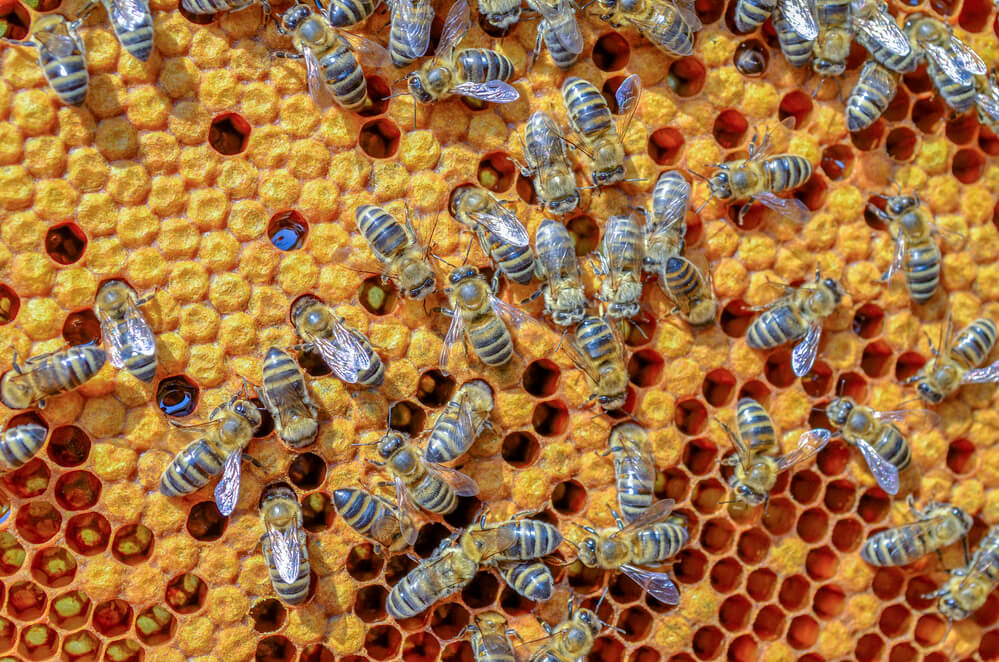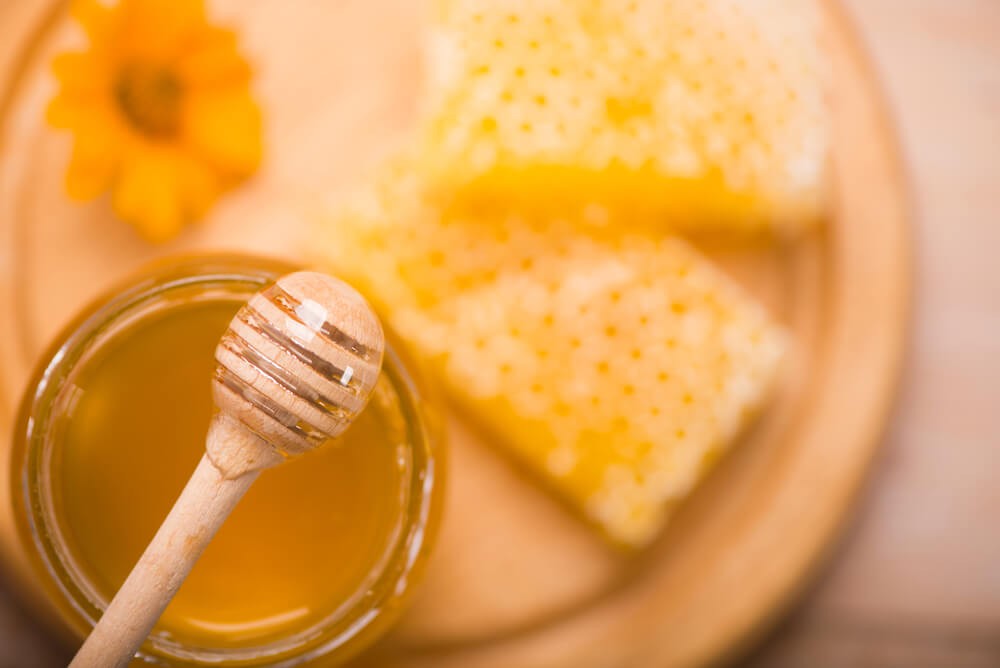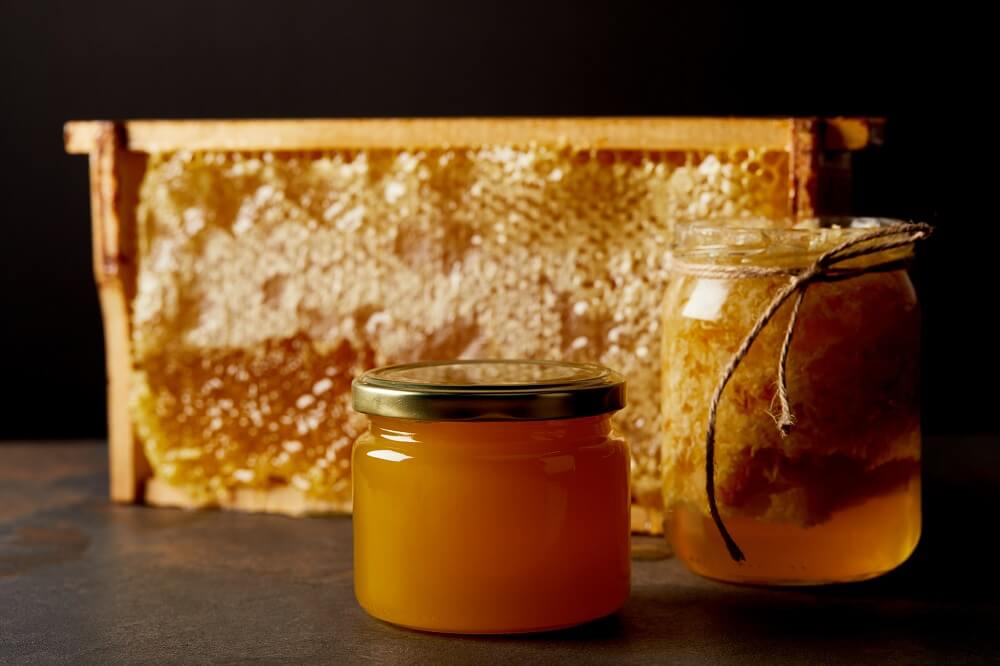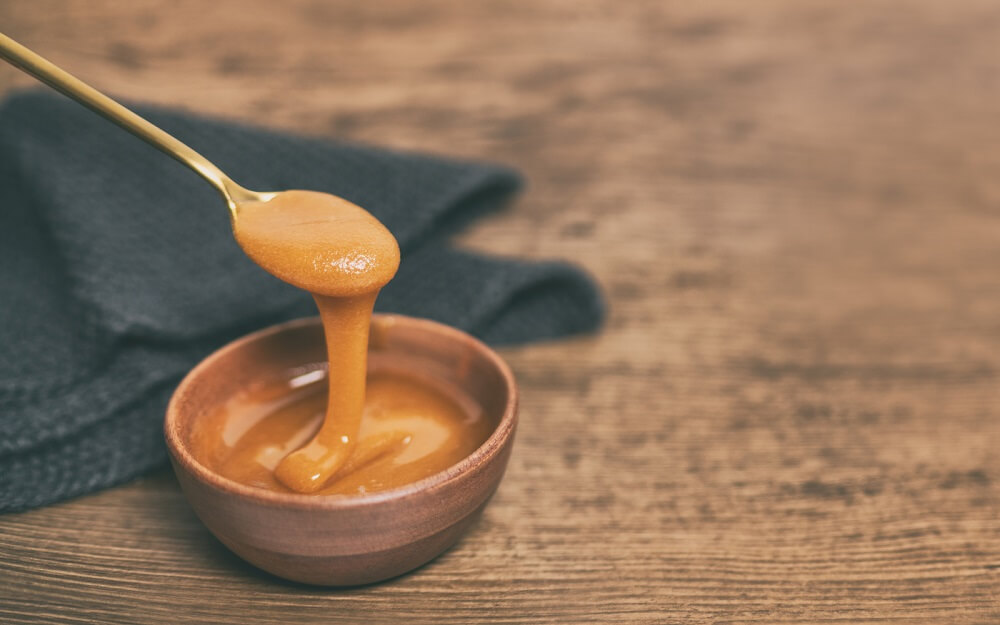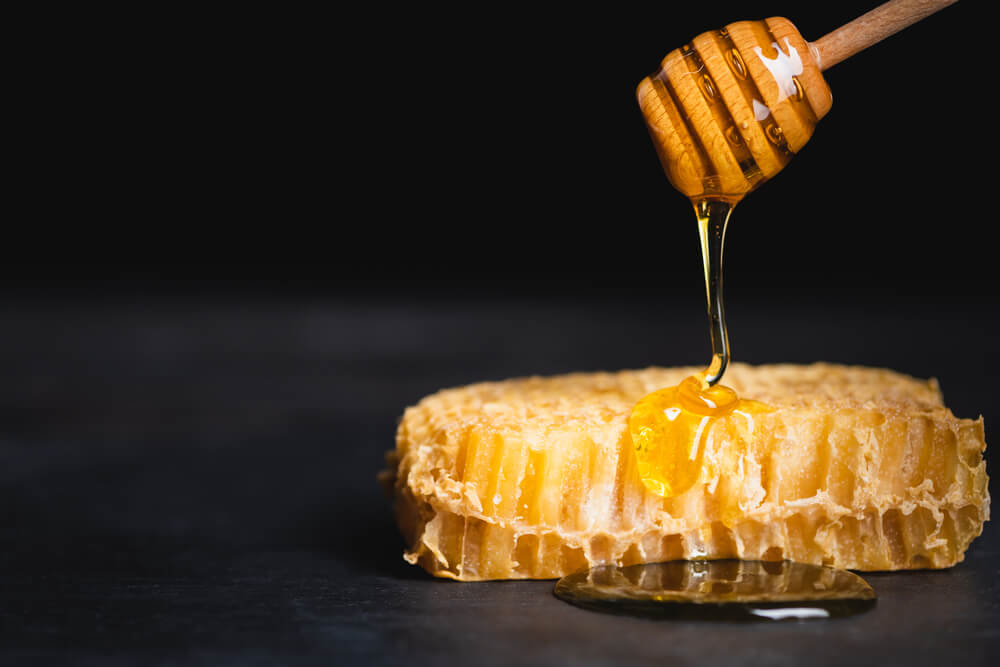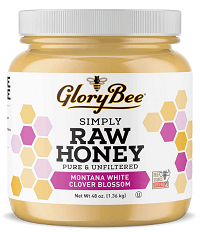Table of Contents:
Can Honey Help With Allergies?
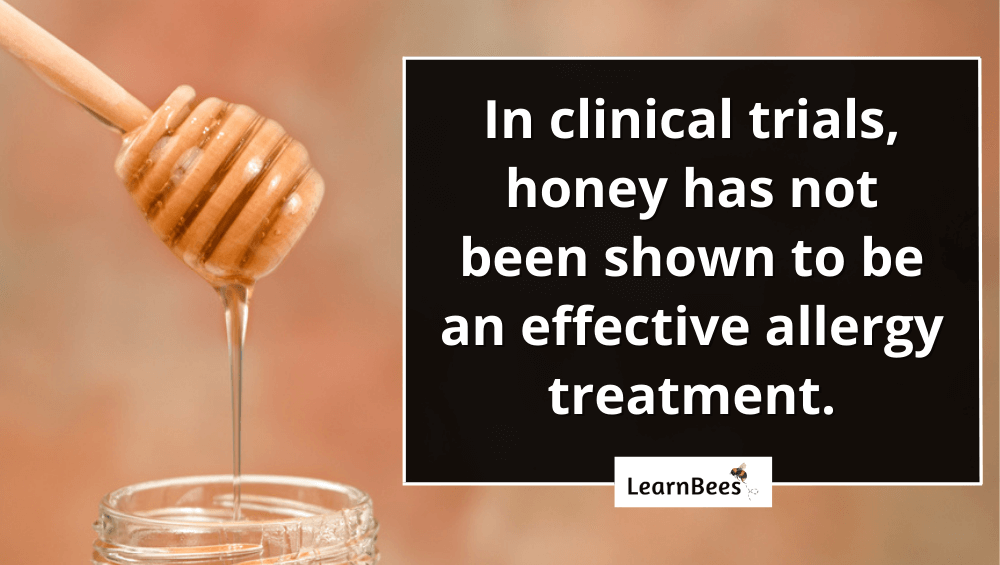
Honey has not been proven as an effective allergy treatment based on facts or research.
However, some people anecdotally report that raw honey lessens their allergy symptoms, despite these results not being proven in clinical trials.
The theory goes like this:
Local raw honey contains traces of pollen found in your area. The idea is that regularly exposing yourself to local pollen will lessen your sensitivity to it. Honey tricks your immune system into responding to the pollen as “food” instead of an “intruder.”
This is similar to how allergy shots work.
Each allergy shot contains a small amount of whatever triggers your allergic reactions. So basically, these allergy shots spark your immune system without leading to a full-blown allergic reaction.
The hypothesis about honey being good for allergies isn’t a bad one. But it simply doesn’t have the research to back it up.
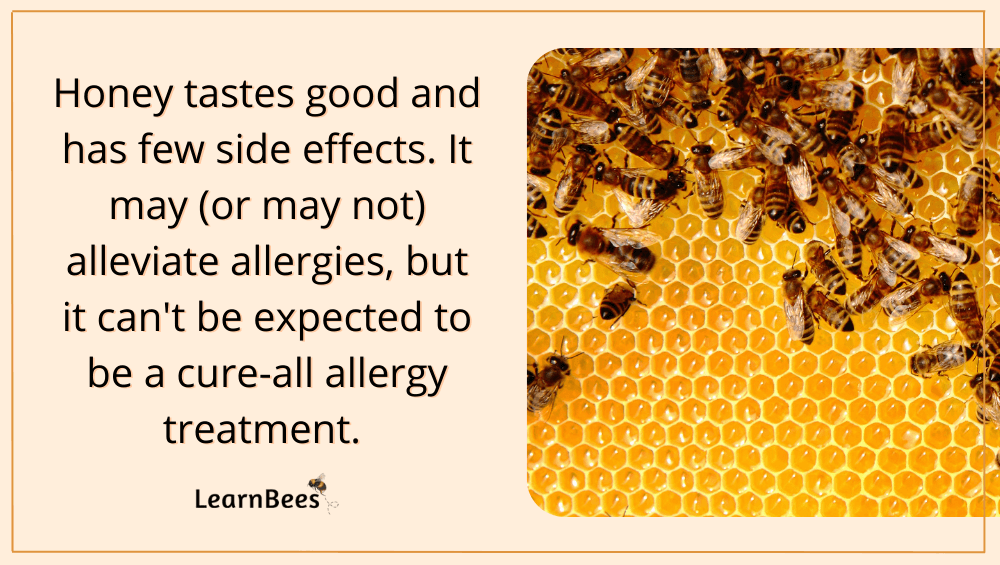
And here’s the thing:
One reason why raw honey isn’t believed to work for allergies is because of the type of pollen it contains. Honey contains flower pollen, not typically tree or grass pollen.
Why is this important?
Because grass and tree pollen are the most common pollen allergies.
That said, some people have personally reported that local raw honey has helped with their allergies. The bottom line is that local honey tastes good and has few side effects. It may (or may not) alleviate allergies, so it might be worth a shot.
If you’re going to try honey for allergies, here are a few suggestions:
- Make sure the honey is local. You can find local honey from a beekeeper or farmers’ market. You typically won’t find it in the grocery store.
- The honey should be raw and unpasteurized. Raw honey hasn’t been heated or filtered, allowing it to remain in its natural state with small traces of pollen included.
- You have to eat several tablespoons per day. If you like honey, then this shouldn’t be a problem. Start with three or four tablespoons daily, and go from there.
What Does Science Say About Honey For Allergies?
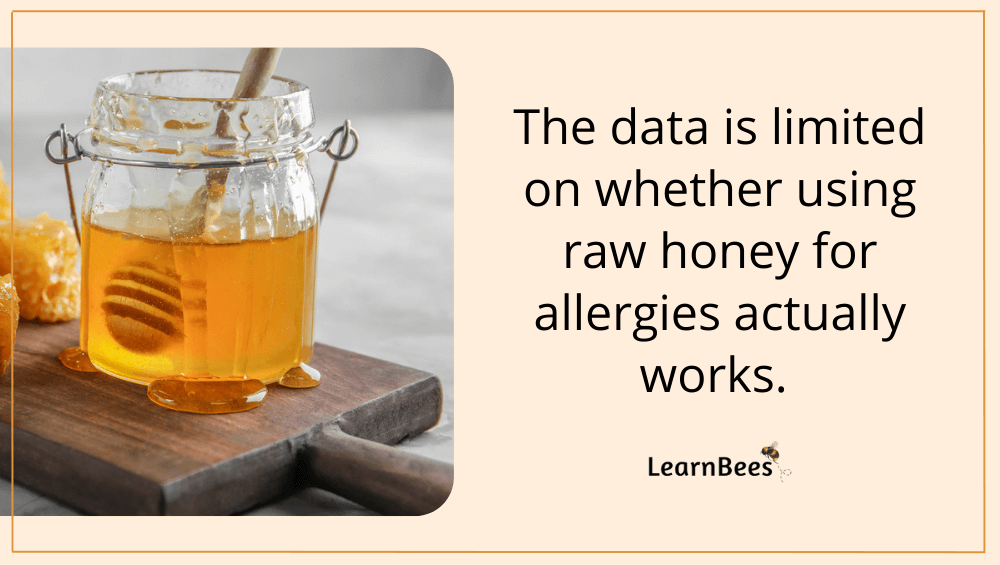
As mentioned, the data is limited on using raw honey for allergies.
One study compared commercial honey, local honey, and honey-flavored corn syrup in a randomized trial. They found no difference between the three. Honey was stated as being no more effective than a placebo for treating allergies.(1)
Another study found that birch honey was effective for treating birch pollen allergies. However, they did nothing to their control group, so this could potentially be a placebo effect.(2)
A different study found that honey eaten at high doses over eight weeks helped to improve a person’s allergy symptoms. The benefits lasted for four weeks after the group stopped taking honey. One group received raw honey, while a control group received a placebo (honey-flavored corn syrup).(3)
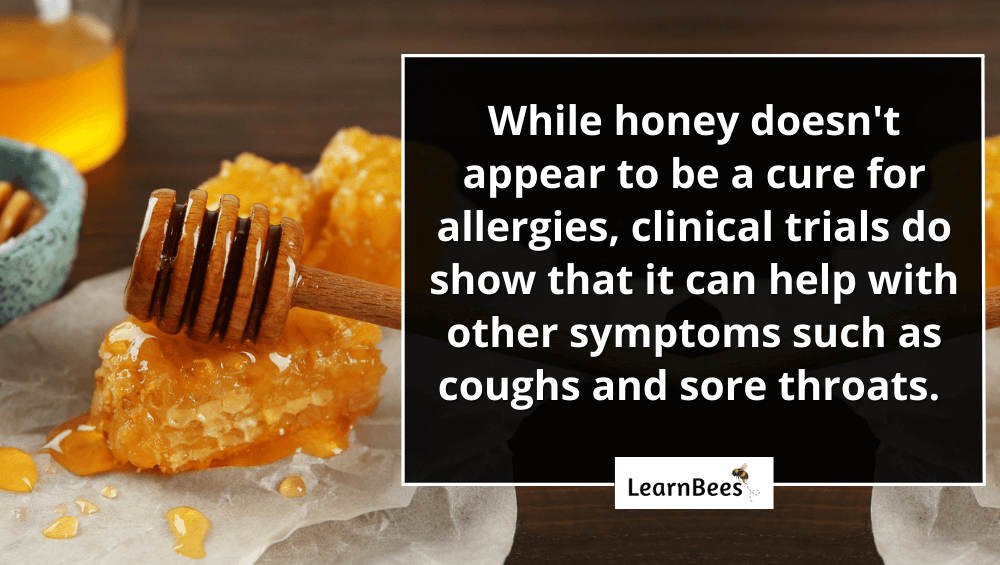
While local honey doesn’t appear to be a cure-all for allergies, clinical trials show that it can help with other symptoms.
For example, raw honey has been praised for helping soothe irritation linked to upper respiratory infections.
More specifically, one review of studies found that honey was better at treating coughs than diphenhydramine (a cough medicine ingredient). Additionally, raw honey can help reduce coughing duration.(4)
Honey has also improved sleep quality among children and parents with coughs.(5)
Furthermore, another review of studies showed that honey could be more effective than other treatments for upper respiratory tract infections. Honey is believed to be effective due to its anti-inflammatory and antibacterial properties.(6, 7)
To take it a step further:
Some research suggests that bee bread may be an effective allergy treatment.(8)
Honeybees make bee bread with pollen, nectar, and honey. The bee’s salvia is mixed with the bee bread, adding probiotic bacteria and yeasts.
What to Know Before Using Honey For Allergies
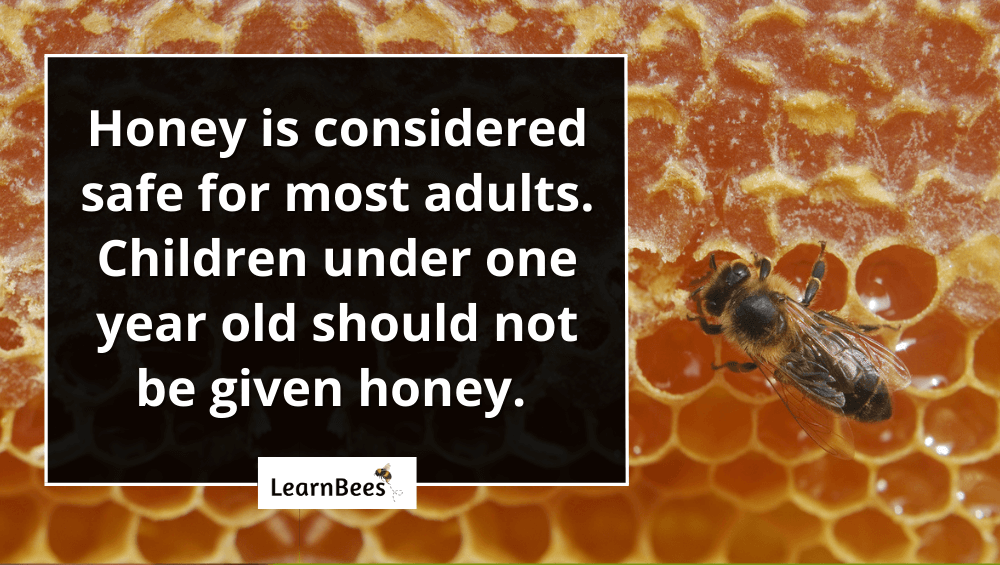
One of the most common questions people ask is:
Is it safe to use honey for allergies?
In most cases, yes. Honey is considered safe for most adults.
With that in mind, honey should not be fed to children under one-year-old. According to the American Academy of Pediatrics, honey can contain botulism spores, which release toxins that can harm babies.(9)
Children can begin consuming honey once they’re older than one year old.
Additionally, it’s important to mention:
Just because you’re allergic to bees doesn’t mean you’ll be allergic to honey. This is because people allergic to bees are allergic to bee venom, not the bee itself. As such, bee allergies only flare up when someone gets stung.
Honey doesn’t contain bee venom, so you shouldn’t have to worry about that.
The only additional consideration is for people with diabetes. Honey can be a better substitute for refined sugars thanks to its antibacterial, anti-inflammatory, and antiviral effects. However, people with diabetes should eat it in moderation because it can cause blood sugar levels to spike.
This is especially true for people who use honey in addition to, rather than instead of, another type of sugar.
FAQs on Honey For Allergies
- What are seasonal allergies?
- Does a tablespoon of honey help with allergies?
- How much honey should I eat for allergies?
- Does eating local honey reduce allergies?
- Can honey make allergies worse?
- Is honey an antihistamine?
- How local should honey be for allergies?
- When is the best time to take honey for allergies?
- Is honey anti-inflammatory?
- How long does it take for honey to kick in?
- What are the side effects of honey?
- Can I use honey for allergies with my toddler?
- Can I use honey for allergies for my baby?
- Can older adults use honey for allergies?
What are seasonal allergies?
Seasonal allergies are allergies that strike at different times of the year. Allergy symptoms most commonly occur when airborne irritants – such as pollen – come into contact with the eyes, nose, or mouth.
In the spring, tree or grass pollen are common culprits.
Grass pollen begins in the late spring and peaks during the summer. Weed pollen (such as ragweed) plagues people mainly in the late summer and fall.
Symptoms of seasonal allergies include a runny or stuffy nose, itchy eyes and nose, sneezing, sore throats, and coughing fits. Seasonal allergies can also become more severe, leading to:
- Fatigue and poor concentration
- An uptick in ear and sinus infections
- Asthma exacerbations
- Disturbed sleep due to symptoms and discomfort
—> Go back to the FAQs on honey for allergies
More to Explore:
- Honey Pasteurization: Does it Ruin Raw Honey?
- Honey for Skin Benefits: Directions, Uses, & Risks
- 8 Scientific Benefits of Raw Honey
Does a tablespoon of honey help with allergies?
Honey has not been medically proven to help with allergies. However, some people swear by it as an effective, natural remedy. This means that honey has anecdotal evidence – rather than scientific proof – to back up its allergy-relieving effects.
With that said, if you try honey as an allergy treatment, you probably need to take several tablespoons instead of just one. In other words, a single tablespoon of honey wouldn’t necessarily provide you with enough pollen to alleviate allergy symptoms.
However, you can experiment and see what works best for you.
—> Go back to the FAQs on honey for allergies
More to Explore:
How much honey should I eat for allergies?
Using honey as an allergy treatment is experimental. Some people try two tablespoons, while others use three or four. We recommend taking several tablespoons instead of just one. To put it simply, a single tablespoon of honey may not be enough to be effective.
Also, try eating the honey straight on its own and not mixed with hot beverages like coffee or tea. We don’t have data showing if honey is altered after being combined with hot liquids – so it’s best to try it by itself.
—> Go back to the FAQs on honey for allergies
More to Explore:
Does eating local honey reduce allergies? Does local honey help with allergies?
Local honey hasn’t been scientifically shown to reduce allergies.
The idea behind using local honey as an allergy treatment is that it can help your body build immunity to the pollen in your area. The logic goes that if you eat honey made from the same pollen causing your allergies, your body will get used to it and eventually stop reacting.
There’s no medical evidence to support this claim, but some people find it helpful. Meaning, honey has anecdotal evidence – rather than scientific proof – to back up its allergy-relieving effects.
The idea isn’t outrageous, though. You may want to try it to see if it works for you, but don’t expect honey to be a cure-all for allergies. Either way, the worst that can happen is you enjoy a sweet treat.
—> Go back to the FAQs on honey for allergies
More to Explore:
Can honey make allergies worse?
Yes, honey can trigger an allergic reaction in some people. Honey contains flower pollen, which is a common allergen. If you’re allergic to flower pollen, there’s a chance you could be allergic to the flower pollen found in honey.
If you’ve never tried honey, it’s best to start with a small amount. See how your body reacts before eating more. You may not experience irritation because honey contains pollen in small amounts, which may not be enough to flare allergies.
But if you’re eating a lot of honey or if you have a severe pollen allergy, there’s a chance you could have a more severe reaction. Symptoms may include headaches, wheezing, and runny noses.
—> Go back to the FAQs on honey for allergies
More to Explore:
Is honey an antihistamine?
An antihistamine is a medication or other compound used to block histamines, which is especially common for treating allergies.
Honey has been used for medical purposes for centuries. It may help some individuals treat their allergy symptoms, but there isn’t enough data suggesting that it can replace antihistamines and other typical allergy treatments.
—> Go back to the FAQs on honey for allergies
More to Explore:
How local should honey be for allergies?
If you’re going to try local honey for allergies, try to buy honey from a nearby beekeeper or farmer’s market. This will typically be honey sourced within 50-100 miles of your home.
—> Go back to the FAQs on honey for allergies
More to Explore:
- The Top 3 Best Manuka Honey Brands
- Orange Blossom Honey: Uses, Benefits, & Risks
- Sourwood Honey: Uses, Benefits, & Risks
When is the best time to take honey for allergies?
There’s no definitive answer, but some people find that taking honey before bedtime helps with allergies. This may be because the honey can coat your throat and reduce irritation from pollen.
You can try taking two to three tablespoons in the morning and two to three in the evening.
—> Go back to the FAQs on honey for allergies
More to Explore:
Is honey anti-inflammatory?
Yes, honey has anti-inflammatory properties. This means it can help reduce swelling, redness, and other signs of inflammation on the skin or throat.
—> Go back to the FAQs on honey for allergies
More to Explore:
- The Brutally Honest Truth About Sour Honey
- Buckwheat Honey: Uses, Benefits, & Risks
- Can You Eat Honeycombs?
How long does it take for honey to kick in?
There is no definitive evidence showing that honey can be effective for allergies. However, one study suggested that honey was beneficial over eight weeks for treating allergies.
—> Go back to the FAQs on honey for allergies
More to Explore:
What are the side effects of honey?
Thankfully, honey doesn’t have a long list of adverse effects.
But it’s important to mention that honey should not be given to babies under one year old. This is because it can contain botulism spores, which can cause a severe form of foodborne illness in infants.
Honey can also trigger an allergic reaction in some people. If you’ve never tried honey before, it’s best to start with a small amount and see how your body reacts. Symptoms of an allergic reaction may include headaches, wheezing, and runny noses.
—> Go back to the FAQs on honey for allergies
More to Explore:
Can I use honey for allergies with my toddler?
Most people can safely try honey as an allergy treatment for toddlers. But as always, consult with your child’s pediatrician before trying new allergy treatments. And remember, don’t expect honey to be a miracle cure for allergies because there haven’t been many clinical trials proving its success.
—> Go back to the FAQs on honey for allergies
More to Explore:
- Fermented Garlic and Honey Recipe
- Cinnamon Honey: Are There Health Benefits?
- What’s the Melting Point of Beeswax?
Can I use honey for allergies for my baby?
No, babies under one year old should not consume honey because it can contain botulism spores, which can cause a severe form of foodborne illness in infants.
—> Go back to the FAQs on honey for allergies
More to Explore:
- Fermented Honey With Ginger Recipe
- What’s the Difference Between Raw and Organic Honey?
- How to Substitute Honey for Sugar
Can older adults use honey for allergies?
Yes, honey can be used by older adults as an allergy treatment. However, it’s always best to check with a doctor before trying new allergy treatments. Additionally, remember that honey can spike blood sugar levels, so it’s important to monitor your blood sugar if you have diabetes.
